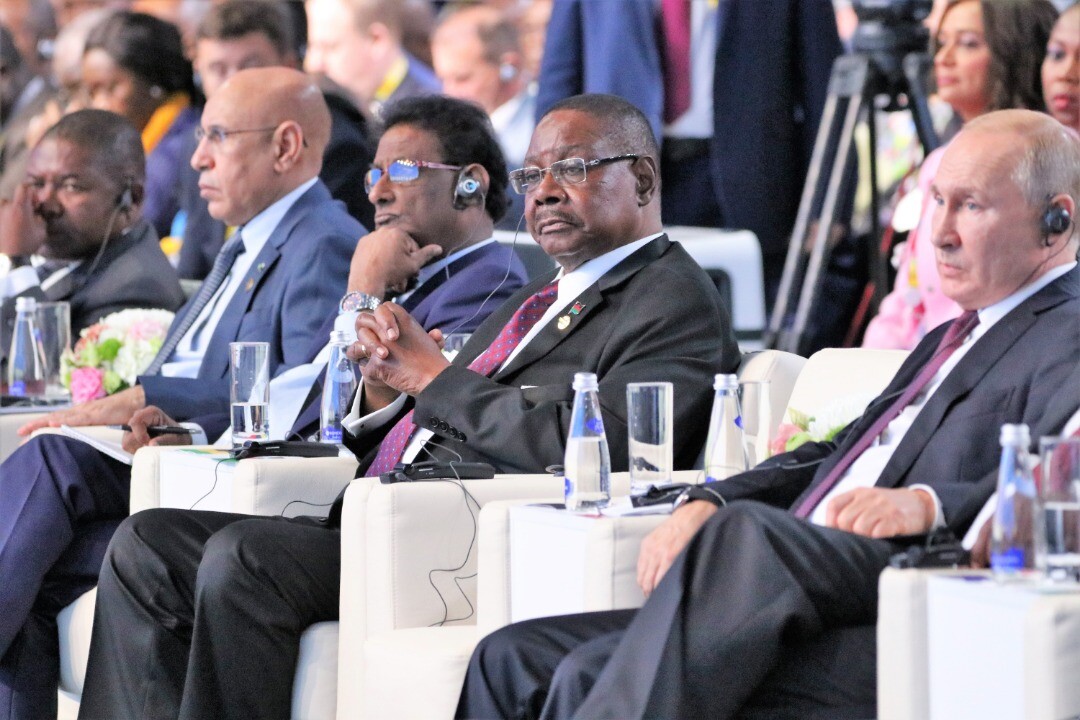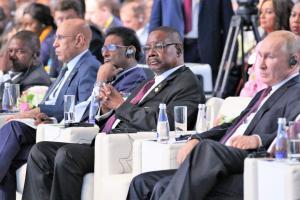
Vladimir Vladimirovich Putin, president of Russia is a character and a half. Typical of his fellas, he divides opinion. For each million adoring fans he has, there is a million elsewhere that loathes him.

In the USA for example, while he is well-regarded by the current occupant of 1600 Pennsylvania Avenue NW in Washington, D.C – a Republican; many other Republicans would spit on Putin’s face given half a chance. For Democrats, the slightest sign of affection towards Putin could end a political career.
That Blues’ Orators is the ‘Putin effect’.
Anyway, love him or loathe him, he hosted the first-ever Russia-Africa summit in October where with due propaganda, fanfare and pomp; memoranda of understanding and cooperation agreements galore were signed.
As per the Moscow Times of October 24, 2019; the deals encompass military and political, energy, economy and trade sectors.
The bonus is a commitment from Putin himself to double the trade volume with Africa – currently estimated at USD20 billion – within the next four to five years.
In short, Russia will supply Nigeria with 12 Mi-35 Hind E attack helicopters and send $4 billion worth of weapons to African countries in 2019.
Russia also wrote off $20 billion of African Countries’ Soviet era debts and offered to mediate Central African Republic and Sudan local conflicts.
Energy-wise, Russia’s state nuclear company Rosatom is pondering building a nuclear power station in Ethiopia. It also signed an agreement to construct a nuclear science and technology centre in Rwanda.
Russia’s state development bank VEB, the Russian Export Centre (a state institute supporting non-commodities exports), the African Export-Import Bank and the Societe Nationale des Petroles du Congo signed an investment cooperation deal on a regional oil product pipeline in the Republic of the Congo.
VEB and the Russian Export Centre also signed a memorandum with Morocco’s MYA Energy on financing a refinery in Morocco.
Russia’s Rosgeo Exploration Company signed memoranda and cooperation agreements with Equatorial Guinea, South Sudan and Rwanda whereas Rostec, the Russian export centre, Russia’s Vi Holding industrial group and the African Export-Import Bank agreed to create an interstate platform for mining projects in Africa.
There is more.
Russia’s largest lender Sberbank, VEB and the Russian Export Centre has teamed up with London-based investment firm Gemcorp Capital in a $5 billion deal to boost trade facilitation between Russia and African countries. This will help Russian exporters by providing financial assistance for the supply of Russian goods to African countries including Angola, Ethiopia, Mozambique and Zimbabwe.
Sberbank will also offer financial support and counsel to Russian exporters’ projects in sectors like agricultural products, fertilizers and medical products.
All this belated ‘largesse’ notwithstanding, Russia still lags far behind its geopolitical competitors in trade with Africa. Its $20 billion trade volume with Africa is a not so significant portion of the European Union’s $334 billion and China’s $204 billion.
Crystal clear from all this is that Malawi came back empty handed.
Compared to Nigeria, Rwanda, Ethiopia, Zimbabwe etc.; putting it in local parlance, Mutharika anangonka ngati okathandiza a mfumu kuledzera (merely went to play the role of the hangers-on who help a chief to get drunk).
All that Prof Peter Mutharika – whose presidency is in serious supposition due to Court Case that is increasingly exposing the Malawi Electoral Commission (MEC)’s inaptitude – brought back were vague promises.
Having said that, from the deals his peers signed, he did a jolly good job of escorting ‘chiefs’ on a drinking excursion.
The only positive for Malawi is that it seems either Putin or his African peers had a man-to-man talk with Mutharika vis-à-vis his evident ineffectuality amidst the political impasse manufactured by MEC in May in lieu of free, fair and credible elections.
Speaking on his return from this deal ridden Russia-Africa summit, for the first since the May election Mutharika said something befitting a leader.
“I am ready to work with anyone else, civil society organisations, the opposition. We should forget the past and work together to rebuild the country. Other African presidents are laughing at us, including the investors. We need to move forward,” Mutharika.
He acknowledged that the prevalent chaos discourages potential investors, something which was obvious from day one.
He added apart from the actual Russia- Africa Summit, Russia also hosted an economic forum attended by different investors, technocrats, through which Malawi can benefit from.
“We have set up a structure on a number of issues, so it will be upon Malawi and other individual countries to take advantage of this; it’s upon us to structure cases where we can benefit; for example, mining technology. I met the largest energy company that deals with Uranium and also nuclear and hydro power. So it’s upon us to structure things in such a way that we can benefit,” he concluded.
Typical of a government that thrives on profligacy, no one has informed Malawians the cost of this trip.
I can dare say that although Malawians are paying taxes through the nose, no one in the disputed government will tell the tax payers how much they have spent to enable Mutharika escort other ‘chiefs’ to Russia.
Given that this government’s legitimacy question is in Court, I won’t dwell on this probable wastage but focus on the number one issue in Malawi or lack thereof: harmony.
Tell me:
- Why did it take Peter Mutharika a whole trip to Russia to realize that without peace and calm, law and order, no self-respecting investor will come to Malawi?
- Can it be that Mutharika is so deaf that he cannot hear the cries of the raped women and girls, and so blind that he cannot see that even he himself can’t travel in hitherto peaceful Malawi without a whole barracks safeguarding him?
What kind of leader needs ‘lots and lots of love from Russia’ to realize that a head deep in sand laissez-faire approach to crises renders nations the laughing stock of the world?
Disgraceful.
This article was first published in the Sunday Times.














